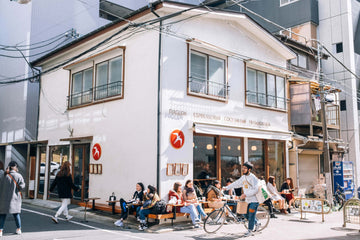FUGLEN Coffee GOGUGU / ETHIOPIA
We also started purchasing goods in Ethiopia in 2020, and this year is our fifth year. The company we trade with, SNAP TRADING, is an exporter of brands like Danche, Halo and Gogugu. I had the opportunity to visit their dry milling plant twice, last year and this year.
The dry mill environment is dusty and noisy due to the nature of the process, but when we visited, the work area was kept very clean and we could see that they are actively investing in quality control equipment. Each department has a manager and, like last year, Mr. Bahar, the head of the classification department, gave us a tour of the facility.
To maintain the high quality of coffee, consistent management from planting to harvesting and refining is essential. As Bahar enthusiastically explained the equipment and process, it was clear that the entire team was seriously committed to quality.
Gogugu washing station was established in 2020 and is located in Guji district of Harowrab County. The area is the highest coffee-growing region in Ethiopia, at over 2,000 meters above sea level. The coffee cherries come from 510 farms in the surrounding area, with each farm ranging from 0.5 to 2 hectares in size, and approximately 1,800 to 2,400 coffee trees per hectare. These farms have fertile red soil, plenty of sunshine, and refreshing cool breezes, which are ideal conditions for producing high-quality coffee. It grows at an altitude of about 2,000 meters, which is considered one of the highest growing areas in Ethiopia. Not only is it the tallest farm, it is also the youngest. Most of these coffee trees are 5 to 10 years old and are relatively young, and are known as "the youngest coffee trees in Ethiopia."
The coffee processing begins with careful hand picking. After picking, the cherries are sorted by hand and pulped using a traditional Agardé disc beater. After the skin and pulp are removed from the parchment, it is screened underwater and divided into first and second grades according to its density.
Next comes the wet fermentation process (where the parchment is fermented in water to break it down), which lasts between 60 and 72 hours, depending on weather conditions. After fermentation, the coffee is washed in channels and graded again by density. During this process, coffee beans with low density will float to the top and be removed, and only coffee beans with high density and good quality will be selected as G1 and G2. After sorting, the potatoes are soaked in clean water for six hours to stabilize their quality.
The next drying process is to stack the coffee into 2 cm high layers and slowly dry them for 13 days. After drying, the fruit undergoes 2-4 hours of meticulous hand sorting to ensure consistent quality.
After sorting, the coffee is packed into burlap bags and sorted according to processing method and grade before being stored in local warehouses. Batch sizes range from 100 to 300 bags and this storage period allows the coffee to condition and reach a uniform moisture content. After a storage period of usually 1-2 months, the parchment is sorted manually at the warehouse if necessary.
After the harvest season is over, the coffee is transported to warehouses and drying factories in Addis Ababa. Transport costs in Ethiopia are high, so efficient transport is required. Before being transported to Addis Ababa, the goods in the trucks are graded and registered at the local ECX (Ethiopian Commodity Exchange) inspection station to become exportable goods.
Finally, the coffee is stored in parchment form in a warehouse in Addis Ababa. During this phase, the team will visit the warehouse and take samples from specific stock lots. Until a contract is concluded and the shipping destination confirmed, the product will remain in parchment to preserve quality.
- Taste: Orange, peach, florals, Earl Grey tea.
- Variety: Dega, Wolisho
- Process: Washed
- Country: Ethiopia
- Region: Guji > Uraga
- Altitude: 1,900-2,000m
- Farm: 450 small-scale farms
- Roast: light roast
- Baking place: Japan
- Roasted date: February 12, 2025
- Material: 100% coffee beans
- Weight: 200g
Pickup currently unavailable

About Fuglen Coffee



